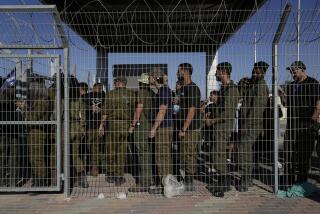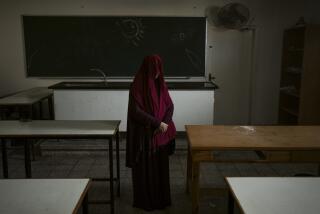Syria detainee’s account offers glimpse of prison system
Reporting from Aleppo, Syria — Al Deen occasionally let out a goofy, drawn-out laugh when he recalled some of the absurdities he had witnessed during his three months of torture and humiliation in Syria’s brutal prisons.
Like the blind man accused of being a sniper.
The sightless prisoner was subjected to a month of interrogation and beatings, Al Deen said, before intelligence officers finally concluded that he was in fact blind and released him.
But he grimaced when he talked about the teenager from the southern province of Dara who had been shot three times, in his shoulder, chest and hand, and was given only a sling — no treatment or pain medication.
“I swear,” recalled Al Deen, which is his middle name, “when he moaned in pain the walls would cry for him.”
In a recent interview, Al Deen, 30, described a regimen of torture and beatings during his imprisonment last year, providing a glimpse of a detention apparatus that has imprisoned tens of thousands since the uprising against President Bashar Assad erupted last March.
Fellow activists confirmed that Al Deen had been detained, but, like so many things in Syria, much of his account could not be independently verified. However, his description of captivity jibes with reports gathered by human rights groups.
In an August report, Amnesty International examined the cases of 88 prisoners, including 10 children, believed to have died while in detention. In at least 52 of the cases, torture or other ill treatment probably caused or contributed to their deaths, Amnesty concluded. The bodies bore signs of burns, blunt force injuries, whipping and slashes.
Even estimating the number of Syrian detainees is difficult. The government gives no official accounting, and many prisoners are held incommunicado; families often have no idea whether they are alive or dead. New security sweeps have followed periodic amnesties, keeping the system in constant flux.
Human rights groups have obtained the names of about 17,000 detainees, but that probably accounts for only 50% of those held, said Neil Sammonds, a researcher with Amnesty.
For a follow-up report in February, Sammonds spoke with former detainees who recounted some of the same torture methods that Al Deen detailed, including the shabeh, being hung by the hands.
Al Deen, originally from the area of Jabal Zawiya in the strife-torn northwestern province of Idlib, began attending antigovernment demonstrations in April, not long after the uprising against Assad began. Soon he was posting protest videos online and organizing meetings in his apartment in Aleppo’s Salahuldeen neighborhood.
On a mid-July morning, he awoke to knocking at the door. He expected it to be a friend but instead found himself face to face with 30 security officers toting Kalashnikov rifles.
Al Deen thus began his sojourn through Assad’s prison system, being shuttled from Aleppo to Damascus to Homs and back again, often being held below ground, sometimes in isolation, sometimes with others, always facing beatings, interrogation and torture.
Al Deen said he was first taken to a military security branch, the building that months later would be blown up in twin bombings in Aleppo. Within a few hours of arrival, Al Deen was hanging from the ceiling by handcuffs, his toes just grazing the ground. He was left in that position for 14 hours the first time, he said.
When he would shift his weight down slightly to relieve his feet, the handcuffs would cut deeper into his wrists. Standing on his toes to take pressure off his wrists would send excruciating pain shooting through his feet and legs.
“Are your hands more important than your feet? Are your feet more important than your hands? You don’t know what to do,” he said.
When he was taken down he was put into a room and ordered to kneel. He was blindfolded but said he could sense several men circling him. One asked Al Deen a question and, before he had finished his answer, the others began pummeling him with fists and sticks. The pattern was repeated over and over, he said.
In his first days in Aleppo, Al Deen was accused of orchestrating explosions and arson and taking part in armed resistance at a time when Aleppo was calm and mostly unengaged in the uprising.
He confessed to everything.
“In the [military] branches if they say, ‘You are Osama bin Laden,’ you say, ‘I am he,’” Al Deen said. “Because the torture that you experience, if I were to describe it, it wouldn’t come close to describing the pain.”
Al Deen, a tall, lanky man, spoke for almost two hours. As he talked, he chain-smoked Lucky Strikes, finishing off one pack before reaching into the pocket of his black leather jacket for another.
He said he suspected that an employee at his small business reported him and his brothers, also opposition activists, to the intelligence services.
Eleven days after Al Deen was arrested, his three brothers were taken as well.
For the first six days at the Aleppo military prison, Al Deen said, he was beaten regularly. He was then transferred to a prison in Damascus. He spent more than a month in a cell three floors below ground level, he said, not seeing the sun once.
There he placed his fingerprint on 12 pages of confessions that he didn’t read or even look at, he said.
Only when he went before a judge did he learn some of the particulars. The list of allegations included having a Facebook account, which he freely acknowledged.
But the worst of his time in captivity, Al Deen said, were the few days that he spent in a prison in Homs, the western city that has become the bloody focal point of the rebellion. He was again kept below ground level but could clearly hear the cries of prisoners being tortured three floors above. Of one man’s loud, desperate pleas, Al Deen recalled, “It was as if he was sitting right beside us now.”
During questioning sessions, his interrogators produced transcripts of the last month of his cellphone conversations. Then, as now, activists organized through coded language, referring to a protest, for instance, as a “wedding.” Authorities pressed him on the hidden meanings.
In the various security branches and cells he moved through, Al Deen said, he met prisoners as young as 12 and as old as 70.
He said he spent his last few weeks of detention in a jail in Aleppo, where his treatment improved markedly. Those in charge were not intelligence agents but police officers, who treated inmates with a measure of respect. Food was ample, so much so that Al Deen said he gained back all the weight he had lost and more.
Eventually Al Deen was granted amnesty and paid 20,000 Syrian pounds (about $410 at the time) in bail. He was released in mid-October. His brothers already had been freed.
But he resumed his activism and was soon a wanted man again. He lived in hiding for months, sleeping at the apartments of relatives and friends but avoiding his home.
Just hours before speaking to a reporter, he attended a funeral procession-turned-protest in Aleppo, a city that has been relatively calm amid Syria’s escalating turmoil.
An activist friend worried that he was taking too many risks, being too casual with his movements. Eventually, Al Deen made the mistake of going back to his family apartment. A neighbor is believed to have tipped off the authorities. He was arrested again in mid-February.
Friends and family suspect that Al Deen is in the custody of the air force security, the most notorious branch of Assad’s repressive apparatus.
Months earlier, after their release from prison, two of his brothers had fled Aleppo for the relative safety of their village. But Al Deen refused to follow.
“Even with the risk,” Al Deen had said during the interview, “I feel my work here is more important.”
More to Read
Sign up for Essential California
The most important California stories and recommendations in your inbox every morning.
You may occasionally receive promotional content from the Los Angeles Times.










